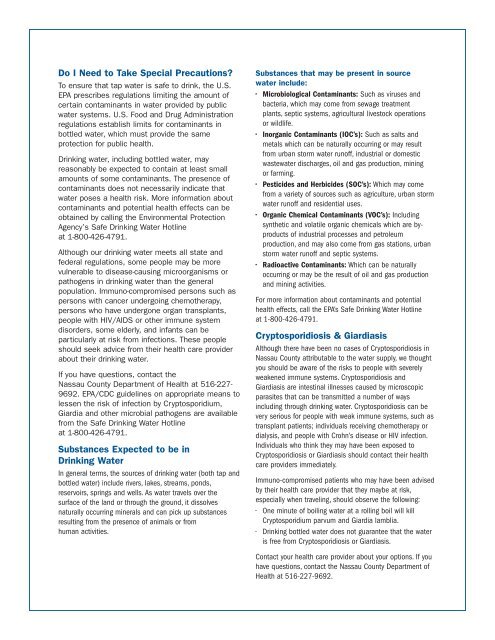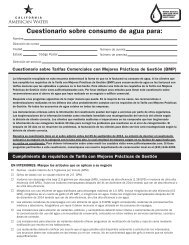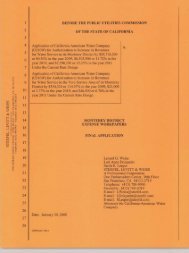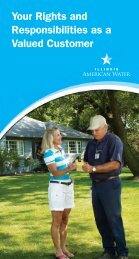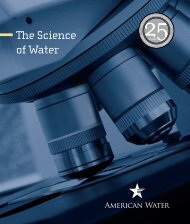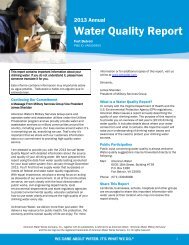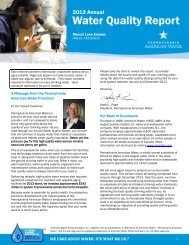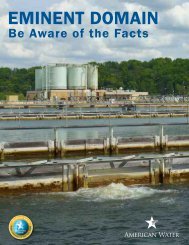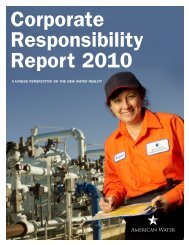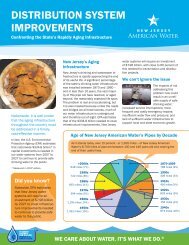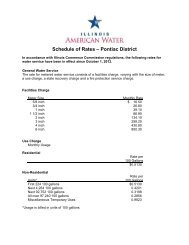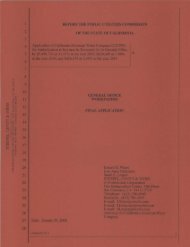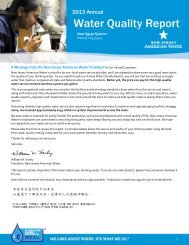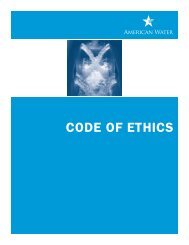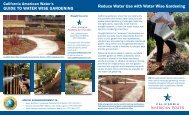Water Quality Report - American Water
Water Quality Report - American Water
Water Quality Report - American Water
Create successful ePaper yourself
Turn your PDF publications into a flip-book with our unique Google optimized e-Paper software.
Do I Need to Take Special Precautions?To ensure that tap water is safe to drink, the U.S.EPA prescribes regulations limiting the amount ofcertain contaminants in water provided by publicwater systems. U.S. Food and Drug Administrationregulations establish limits for contaminants inbottled water, which must provide the sameprotection for public health.Drinking water, including bottled water, mayreasonably be expected to contain at least smallamounts of some contaminants. The presence ofcontaminants does not necessarily indicate thatwater poses a health risk. More information aboutcontaminants and potential health effects can beobtained by calling the Environmental ProtectionAgency’s Safe Drinking <strong>Water</strong> Hotlineat 1-800-426-4791.Although our drinking water meets all state andfederal regulations, some people may be morevulnerable to disease-causing microorganisms orpathogens in drinking water than the generalpopulation. Immuno-compromised persons such aspersons with cancer undergoing chemotherapy,persons who have undergone organ transplants,people with HIV/AIDS or other immune systemdisorders, some elderly, and infants can beparticularly at risk from infections. These peopleshould seek advice from their health care providerabout their drinking water.If you have questions, contact theNassau County Department of Health at 516-227-9692. EPA/CDC guidelines on appropriate means tolessen the risk of infection by Cryptosporidium,Giardia and other microbial pathogens are availablefrom the Safe Drinking <strong>Water</strong> Hotlineat 1-800-426-4791.Substances Expected to be inDrinking <strong>Water</strong>In general terms, the sources of drinking water (both tap andbottled water) include rivers, lakes, streams, ponds,reservoirs, springs and wells. As water travels over thesurface of the land or through the ground, it dissolvesnaturally occurring minerals and can pick up substancesresulting from the presence of animals or fromhuman activities.Substances that may be present in sourcewater include:• Microbiological Contaminants: Such as viruses andbacteria, which may come from sewage treatmentplants, septic systems, agricultural livestock operationsor wildlife.• Inorganic Contaminants (IOC’s): Such as salts andmetals which can be naturally occurring or may resultfrom urban storm water runoff, industrial or domesticwastewater discharges, oil and gas production, miningor farming.• Pesticides and Herbicides (SOC’s): Which may comefrom a variety of sources such as agriculture, urban stormwater runoff and residential uses.• Organic Chemical Contaminants (VOC’s): Includingsynthetic and volatile organic chemicals which are byproductsof industrial processes and petroleumproduction, and may also come from gas stations, urbanstorm water runoff and septic systems.• Radioactive Contaminants: Which can be naturallyoccurring or may be the result of oil and gas productionand mining activities.For more information about contaminants and potentialhealth effects, call the EPA’s Safe Drinking <strong>Water</strong> Hotlineat 1-800-426-4791.Cryptosporidiosis & GiardiasisAlthough there have been no cases of Cryptosporidiosis inNassau County attributable to the water supply, we thoughtyou should be aware of the risks to people with severelyweakened immune systems. Cryptosporidiosis andGiardiasis are intestinal illnesses caused by microscopicparasites that can be transmitted a number of waysincluding through drinking water. Cryptosporidiosis can bevery serious for people with weak immune systems, such astransplant patients; individuals receiving chemotherapy ordialysis, and people with Crohn’s disease or HIV infection.Individuals who think they may have been exposed toCryptosporidiosis or Giardiasis should contact their healthcare providers immediately.Immuno-compromised patients who may have been advisedby their health care provider that they maybe at risk,especially when traveling, should observe the following:• One minute of boiling water at a rolling boil will killCryptosporidium parvum and Giardia lamblia.• Drinking bottled water does not guarantee that the wateris free from Cryptosporidiosis or Giardiasis.Contact your health care provider about your options. If youhave questions, contact the Nassau County Department ofHealth at 516-227-9692.


